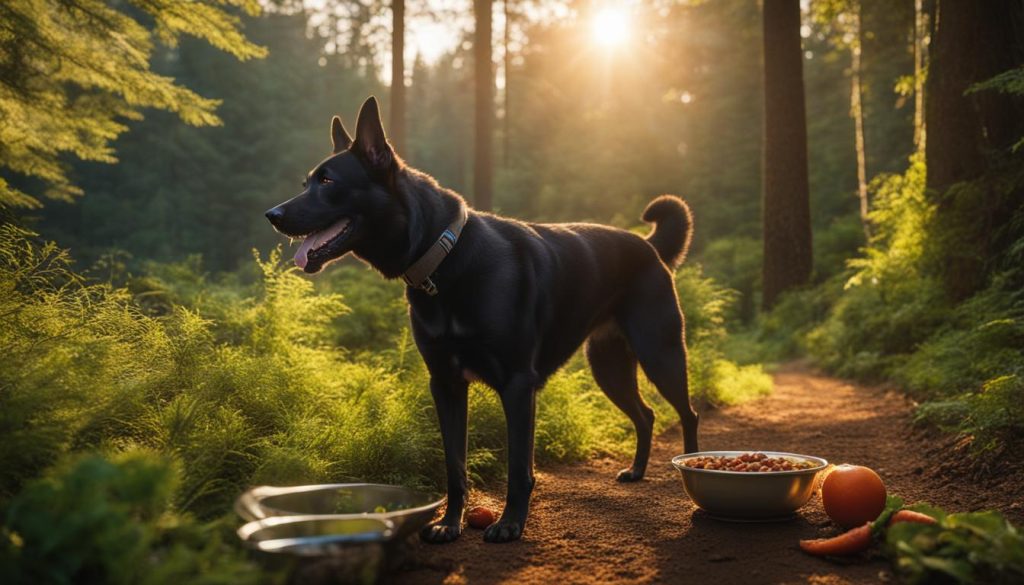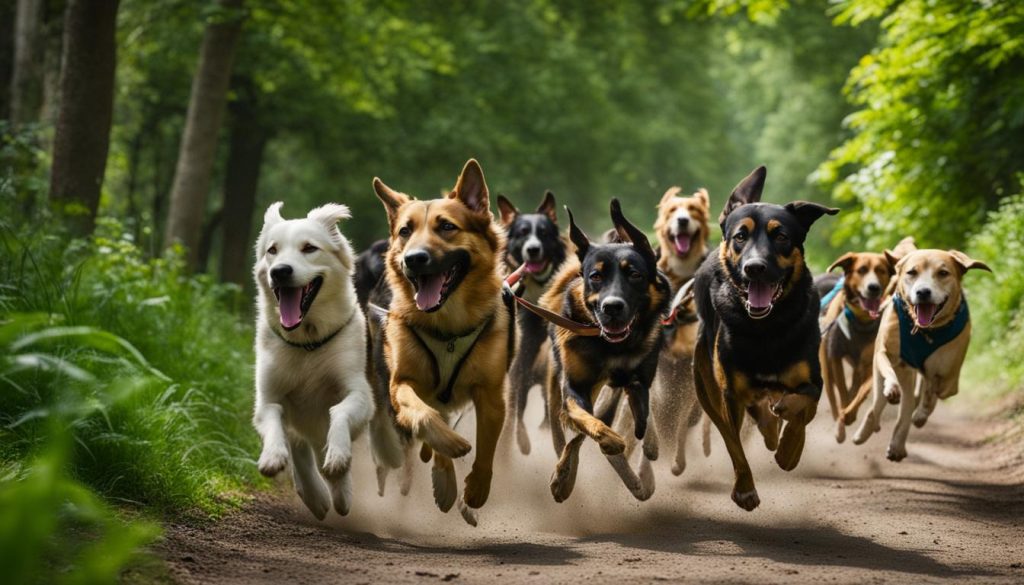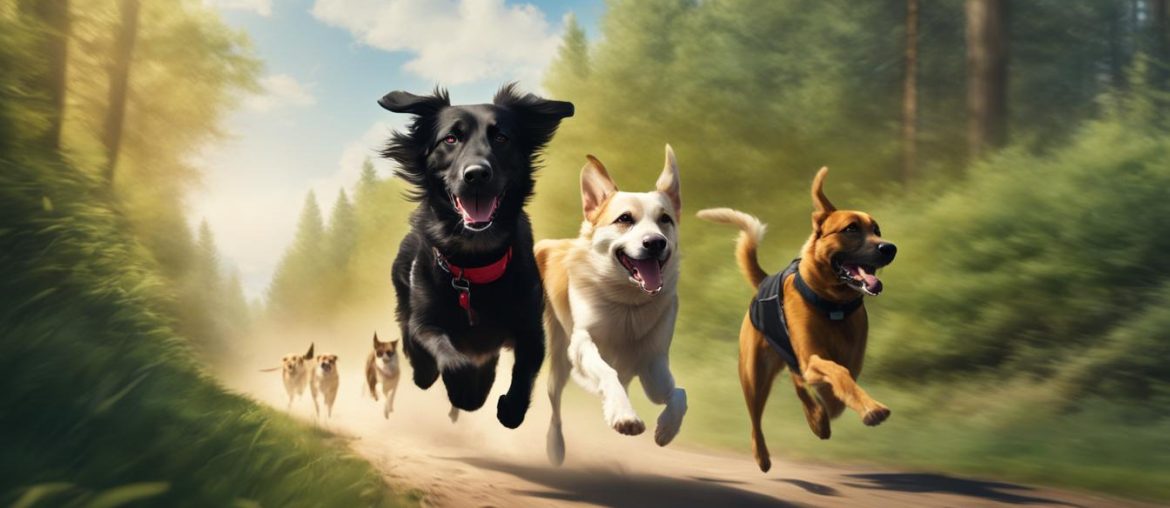Dogs are incredible animals known for their strength, agility, and unwavering loyalty. As a dog owner, you may have wondered if your furry companion can join you on your next marathon adventure. Can a dog run a marathon? The answer is yes, but it requires careful training, nutrition, and preparation.
Training a dog for a marathon involves understanding their physical abilities and limitations. Just like humans, dogs need to build their endurance gradually over time. Starting with shorter runs and gradually increasing the distance and intensity is key to preventing injuries and ensuring your dog’s safety. Additionally, consulting with a veterinarian before beginning a marathon training program is essential to evaluate your dog’s overall health and fitness level.
Key Takeaways:
- Dogs can be trained to run marathons with proper training and care.
- Gradually increasing the distance and intensity of runs is crucial for building endurance.
- Consulting with a veterinarian is important to ensure your dog’s health and safety.
- Nutrition plays a vital role in maintaining your dog’s energy levels during long runs.
- Building a strong bond and trust with your dog is crucial for successful marathon training.
Can Dogs Physically Handle the Rigors of Running a Marathon?
Dogs have pretty good physical abilities that make them capable of running long distances, including marathons. However, you should consider several factors to ensure their safety and well-being during the training and actual marathon. Some breeds, like Border Collies and Labrador Retrievers, naturally excel at endurance activities, while others may require additional training and conditioning to build their stamina.
Gradual and progressive training is essential to prepare dogs for marathon distances. Just like humans, dogs need to build up their endurance over time. Starting with shorter runs and gradually increasing the distance and intensity helps their bodies adapt and reduces the risk of injuries. You might want to monitor their hydration and nutrition during training to maintain their energy levels and prevent dehydration.

While it is possible for dogs to run marathons, you should be mindful of their individual limitations and capabilities. It is recommended to consult with a veterinarian before starting a marathon training program with your dog. They can provide guidance on your dog’s specific needs and ensure they are fit for the physical demands of marathon running.
| Factors to Consider for Dog Marathon Training | Tips |
|---|---|
| 1. Breed and Physical Fitness | Choose a breed that is naturally suited for endurance activities and assess your dog’s overall physical fitness. |
| 2. Progressive Training | Start with shorter runs and gradually increase the distance and intensity over time. |
| 3. Hydration and Nutrition | Monitor your dog’s hydration during runs and provide them with adequate water breaks. Ensure a balanced diet with proper nutrition to support their energy needs. |
| 4. Veterinary Consultation | Consult with a veterinarian to assess your dog’s fitness and receive guidance specific to their needs and abilities. |
By considering these factors and following a proper training and care plan, dogs can indeed handle the rigors of running a marathon and enjoy the experience alongside their owners.
Training Tips for Dog Marathons
When it comes to training a dog for a marathon, there are several key tips to keep in mind. I recommend that you start slow and gradually increase the distance and intensity of the runs over several months. Begin with shorter runs and build up to longer distances to allow your dog’s body to adapt and build endurance. Incorporating strength and agility exercises into their training routine can also help improve their overall fitness and performance. Listening to your dog’s cues is crucial – pay attention to signs of fatigue or discomfort and adjust the training accordingly. Rest days and recovery periods are essential to prevent injuries and allow your dog’s body to rest and rebuild.
A strong bond and trust between you and your dog is paramount for successful marathon training. This means consistently providing positive reinforcement and rewards for their efforts and progress. I recommend that you make training sessions enjoyable and engaging for your dog, incorporating play and other activities that they love. Regularly assessing their progress and adjusting the training plan as needed will ensure that they continue to develop their stamina and endurance.
Table:
| Training Tips for Dog Marathons | Summary |
|---|---|
| Start slow and gradually increase distance and intensity | Allows dog’s body to adapt and build endurance |
| Incorporate strength and agility exercises | Improves overall fitness |
| Listen to your dog’s cues | Adjust training based on signs of fatigue or discomfort |
| Provide rest days and recovery periods | Prevents injuries and allows for rest and rebuilding |
| Build a strong bond and trust with your dog | Consistently provide positive reinforcement and rewards |
| Make training sessions enjoyable and engaging | Incorporate play and activities your dog loves |
| Regularly assess progress and adjust training plan | Ensure continued development of stamina and endurance |
To put it simply, every dog is unique, and tailor their training to their individual needs and capabilities. Consulting with a veterinarian or professional dog trainer can provide valuable guidance and ensure that you’re providing the best possible training program for your dog. With patience, consistent effort, and proper training, your dog can be well-prepared to take on the challenge of a marathon alongside you.
Nutrition Tips for Dog Marathon Training
Proper nutrition is vital for dogs training for a marathon. Just like humans, dogs need a balanced diet that provides them with the necessary nutrients to fuel their bodies during long-distance running. A diet rich in high-quality protein, healthy fats, and carbohydrates is essential for sustained energy and muscle recovery. Consult with a veterinarian or a canine nutritionist to determine the specific dietary needs of your dog based on their breed, size, and activity level.
During long runs, you should provide your dog with water and snacks to maintain their hydration and energy levels. You can use collapsible bowls or specialized hydration packs designed for dogs to make it easier to carry water during the run. I highly suggest that you monitor your dog’s fluid intake and offer them water at regular intervals to prevent dehydration.
In addition to proper hydration, consider incorporating supplements or specialized dog foods designed for endurance athletes into your dog’s diet. These can provide additional nutrients, such as electrolytes and antioxidants, to support their overall health and performance during marathon training. However, always consult with a veterinarian before introducing any new supplements or foods into your dog’s diet.
Table: Nutritional Considerations for Dog Marathon Training
| Nutrient | Importance | Food Sources |
|---|---|---|
| Protein | Building and repairing muscles | Lean meats, fish, eggs, dairy, legumes |
| Fats | Source of sustained energy | Fish oil, olive oil, coconut oil |
| Carbohydrates | Immediate energy source | Whole grains, fruits, vegetables |
| Electrolytes | Maintaining hydration and nerve function | Sodium, potassium, magnesium |
| Antioxidants | Supporting overall health and recovery | Blueberries, spinach, carrots |
To put it simply, every dog is unique, and their nutritional needs may vary. You should also monitor your dog’s weight, energy levels, and overall health during marathon training. Make adjustments to their diet as needed and consult with a professional to ensure they are getting the right nutrients for optimal performance and well-being.

Benefits and Risks of Running Marathons with Dogs
Running marathons with dogs can offer a range of benefits for both the dog and the owner. It not only provides a physical challenge but also promotes mental stimulation and strengthens the bond between the two. Dogs are natural runners, and engaging in marathon training allows them to fulfill their natural instincts while also promoting their overall fitness and well-being.
One of the main benefits of running marathons with dogs is the improvement in physical fitness. Regular training helps dogs build endurance, improve cardiovascular health, and increase their overall stamina. It also aids in weight management and can help prevent obesity-related health issues.
The mental stimulation that comes with marathon training is also significant. Dogs crave mental challenges, and the intense focus required during long-distance runs can provide them with a sense of purpose and accomplishment. It helps alleviate boredom and restlessness, leading to a happier and more fulfilled dog.
However, be aware of the risks involved in running marathons with dogs. The physical demands of marathon training can put strain on their bodies, increasing the risk of injuries such as muscle strains, joint issues, or paw injuries. Dogs can also be susceptible to heat exhaustion and dehydration, especially during long runs in hot weather. I highly suggest that you monitor their well-being during training and ensure they have proper rest and recovery periods.
| Benefits | Risks |
|---|---|
| Improves physical fitness | Increased risk of injuries |
| Promotes mental stimulation | Potential heat exhaustion and dehydration |
| Strengthens the bond between dog and owner |
Running marathons with dogs can be a rewarding experience, but it is essential to approach it with caution and careful consideration. Consulting with a veterinarian, gradually increasing training intensity, and prioritizing the dog’s health and well-being throughout the process are key factors in ensuring a positive and safe marathon experience for both the dog and the owner.
Preparing Your Dog for a Marathon: Considerations and Training Plan
Preparing your dog for a marathon requires careful consideration and the development of a comprehensive training plan. Before embarking on this journey, it is good practice to evaluate your dog’s overall health and fitness level. A visit to the veterinarian will ensure that your dog is in good condition and capable of handling the physical demands of marathon training.
Once you have the green light from your veterinarian, it’s time to develop a training plan tailored to your dog’s needs. This plan should include a combination of running, strength training, rest days, and cross-training activities to build endurance and stamina. Gradually increase the distance and intensity of your dog’s runs over several months, allowing their body to adapt to the increased workload.
Monitoring your dog’s progress and adjusting the training plan as necessary is vital for successful marathon preparation. Keep a close eye on your dog’s overall well-being, including their hydration, nutrition, and rest. Regular check-ins with your veterinarian throughout the training process will ensure that your dog remains healthy and injury-free.
To put it simply, the key to preparing your dog for a marathon is gradual and consistent training. Building a strong bond and trust with your dog throughout the process will also contribute to a successful marathon experience. With proper preparation and care, your dog can join you on the journey to conquer a marathon!

| Considerations for Preparing Your Dog for a Marathon | Training Plan for Your Dog |
|---|---|
|
|
Dog Marathon Endurance: Building Stamina and Mental Resilience
Building endurance and mental resilience in dogs for marathon training requires a systematic approach. Gradually increasing the distance and intensity of the runs is essential to build the dog’s stamina. Incorporating interval training and hill workouts can help improve the dog’s speed and endurance. Mental resilience can be developed by exposing the dog to various environmental stimuli during training, such as different terrains, weather conditions, and distractions. Positive reinforcement and rewards play a crucial role in motivating and reinforcing desired behaviors in the dog.
During marathon training, you should monitor the dog’s progress and adjust the training plan accordingly. Training sessions should be challenging but not overwhelming, allowing the dog to push their limits while still maintaining their well-being. By gradually increasing the intensity and duration of the runs, dogs can build their physical and mental endurance, preparing them for the demands of a marathon.
Benefits of Interval Training:
- Improves cardiovascular fitness
- Increases speed and endurance
- Builds mental resilience
- Helps prevent boredom and burnout
“Interval training is a valuable tool in developing a dog’s marathon endurance. By alternating between periods of high-intensity running and recovery, dogs can improve their cardiovascular fitness, increase their speed, and enhance their mental resilience. I recommend that you gradually introduce intervals and monitor the dog’s response to avoid overexertion or injury.”
Additionally, cross-training activities such as swimming or hiking can be beneficial for building overall fitness and strengthening different muscle groups. Varying the dog’s training routine not only helps prevent boredom but also enhances their adaptability to different physical challenges they may encounter during a marathon.
| Training Tips for Building Dog Marathon Endurance | Mental Resilience Exercises |
|---|---|
|
|
By implementing a well-rounded training program that focuses on building endurance and mental resilience, dogs can successfully complete a marathon and enjoy the journey alongside their owners.

| Signs of Fatigue: | Signs of Discomfort: | Signs of Dehydration: |
|---|---|---|
| – Slowing down – Lagging behind – Heavy panting – Frequent stops to rest |
– Limping or favoring a limb – Excessive licking – Whining or whimpering – Reluctance to continue running |
– Excessive thirst – Dry or sticky gums – Sunken eyes – Dark, concentrated urine |
Maintaining your dog’s health and well-being during marathon training is crucial for their safety and performance. By ensuring proper nutrition, regular veterinary check-ups, adequate rest and recovery, and closely monitoring signs of fatigue and discomfort, you can help your dog thrive throughout their marathon training journey.
Tips for Running a Marathon with Your Dog: Race Day and Beyond
Running a marathon with your dog can be an exciting and fulfilling experience. However, be prepared and take certain precautions to ensure the safety and well-being of your furry companion. Here are some tips to help you navigate race day and beyond:
Before the Race:
- Ensure your dog is properly trained and conditioned for marathon distances. Gradually increase the length and intensity of your training runs to build their endurance.
- Get your dog’s health checked by a veterinarian to ensure they are fit to participate in the marathon. Make sure they are up to date on vaccinations and free from any underlying health conditions.
- Pack essential items such as collapsible bowls for water breaks, treats, a leash, and waste disposal bags.
On Race Day:
- Start the marathon at a slow and steady pace to allow your dog to warm up. Avoid sudden bursts of speed or excessive pulling on the leash.
- Monitor your dog’s hydration and offer water at designated water stations or during breaks. Be mindful of their energy levels and signs of fatigue.
- Pay attention to your dog’s body language and any signs of discomfort. If they are struggling or showing signs of distress, consider slowing down or stopping the race.
After the Race:
- Provide your dog with plenty of rest and recovery time after the marathon. Allow them to relax and rejuvenate their muscles.
- Monitor your dog for any post-race soreness or injuries. If you notice any limping or unusual behavior, consult with a veterinarian.
- Continue to prioritize your dog’s health and well-being even after the race is over. Maintain a balanced diet, regular exercise, and routine veterinary check-ups.
By following these tips, you can have a successful and enjoyable marathon experience with your dog. Try to always prioritize their safety and well-being throughout the training and race process.
| Benefit | Risk |
|---|---|
| Improved physical fitness | Potential for injuries |
| Mental stimulation | Heat exhaustion |
| Stronger bond between dog and owner | Overexertion |
Final Thoughts
To sum it up, the answer to the question “Can a dog run a marathon?” is a resounding yes. With proper training, nutrition, and care, dogs can be prepared to tackle the physical demands of long-distance running. However, it is good practice to consider the individual dog’s abilities, health, and temperament before embarking on marathon training.
Consulting with a veterinarian is essential to ensure the dog is in good health and capable of handling the rigors of marathon training. A tailored training plan that gradually increases mileage and incorporates strength and agility exercises is key to building the dog’s endurance and overall fitness.
Proper nutrition and hydration are vital to maintain the dog’s energy levels during the marathon. Consulting with a veterinarian or canine nutritionist can help determine the best dietary approach for the dog’s specific needs. Additionally, monitoring the dog’s health, providing rest and recovery days, and being aware of signs of fatigue or discomfort are important for their well-being.
Running a marathon with a dog can be a fulfilling experience, strengthening the bond between the dog and the owner while promoting overall fitness and well-being. However, you should prioritize the dog’s safety and to always prioritize their health and needs throughout the training and marathon journey.
FAQ
Can any dog run a marathon?
While dogs have the physical capabilities to run long distances, not all dogs are suited for marathon training. Certain breeds, such as Border Collies and Labrador Retrievers, may be more naturally inclined for distance running.
How do I train my dog for a marathon?
Training a dog for a marathon requires gradually increasing their mileage and intensity over several months. I recommend that you start with shorter runs and incorporate strength and agility exercises to build their endurance. Consultation with a veterinarian is recommended before starting a training program.
What should I feed my dog during marathon training?
Dogs training for a marathon require a balanced diet that includes high-quality protein, healthy fats, and carbohydrates for sustained energy. Consulting with a veterinarian or canine nutritionist can help determine the specific dietary needs of your dog.
What are the benefits and risks of running marathons with dogs?
Running marathons with dogs can improve their physical fitness, mental stimulation, and strengthen the bond between dog and owner. However, there are risks of injuries, heat exhaustion, and overexertion that need to be carefully managed.
How do I prepare my dog for a marathon?
Before preparing a dog for a marathon, evaluate their overall health and fitness level. A veterinarian should perform a check-up, and a training plan should be developed that includes a combination of running, strength training, rest days, and cross-training activities.
How can I build endurance and mental resilience in my dog for marathon training?
Endurance and mental resilience in dogs can be built through a systematic approach that gradually increases the distance and intensity of their runs. Interval training, hill workouts, and exposure to different environmental stimuli can also help improve their stamina and mental toughness.
How do I keep my dog healthy and safe during marathon training?
Regular check-ups with a veterinarian, monitoring hydration and nutrition, providing proper warm-up and cool-down exercises, and being aware of signs of fatigue and discomfort are all crucial for keeping your dog healthy and safe during marathon training.
What should I do on race day when running a marathon with my dog?
On race day, start with a slow and steady pace, keep your dog hydrated throughout the race, and be aware of signs of fatigue or discomfort. After the marathon, providing ample rest and recovery time for your dog is crucial.
Can any dog run a marathon?
While dogs have the physical capabilities to run long distances, not all dogs are suited for marathon training. Certain breeds, such as Border Collies and Labrador Retrievers, may be more naturally inclined for distance running.






